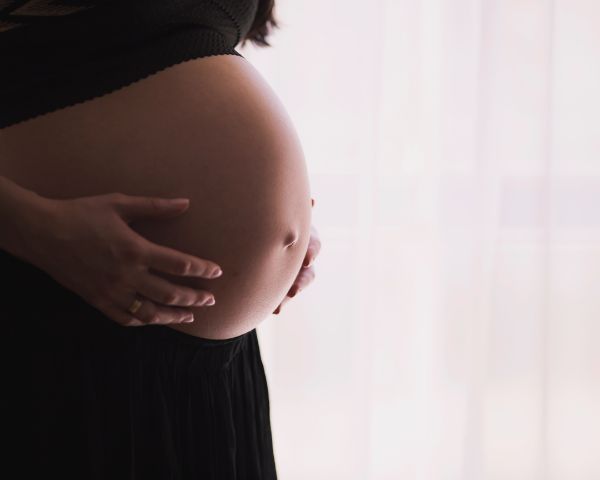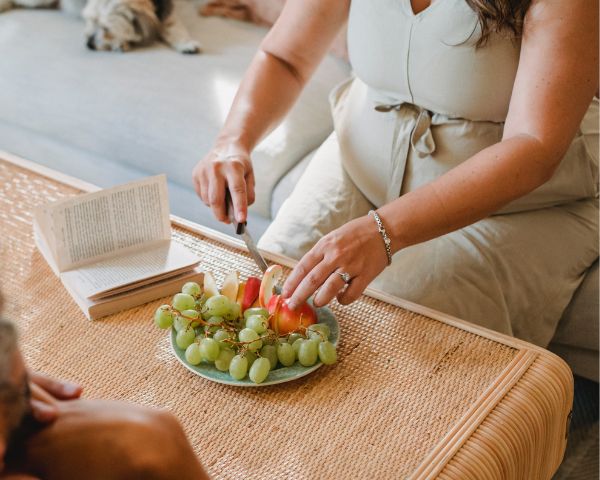Constipation is defined as having fewer than three bowel movements per week, and it can be caused by hormonal changes, dietary changes, and a decrease in physical activity during pregnancy. [1]
You can read this article and learn about home remedies to relief constipation.
At the same time if you are suffering from nausea during pregnancy, here is an article about taking Unisom and B6 for morning sickness.

What is the daily recommended consumption of dietary fiber?
To reduce constipation, the daily recommended consumption of dietary fiber is 25-38 grams per day for adults, depending on age and gender. High fiber diet is important for digestive health and helps to reduce the risk of chronic diseases such as heart disease, diabetes, and obesity. Foods high in dietary fiber include fruits, vegetables, legumes, nuts, and whole grains [2]
It is also important to drink plenty of water to help the body absorb fiber. A high-fiber diet includes plenty of high-fiber foods and is a great way to boost fiber intake, iron supplements are another option. Eating a high-fiber diet that is rich can help to keep you feeling full for longer, and can help to regulate your blood sugar levels. It can also help to lower cholesterol levels and reduce the risk of constipation. [3]
What causes constipation during pregnancy?
Constipation is a common complaint during pregnancy, affecting up to half of all pregnant women. Constipation is defined as having fewer than three bowel movements per week and is usually caused by a combination of factors. Hormonal changes: During pregnancy, the body produces the hormone progesterone, which relaxes the muscles of the digestive tract, slowing down digestion and causing constipation. [4]
Iron supplements: Iron supplements, which are often prescribed during pregnancy, can cause constipation. Dietary changes: Pregnant women often experience cravings for certain foods, which can lead to an unhealthy diet.
Constipation during pregnancy is a common issue, but it can be managed with lifestyle changes. Eating a balanced diet that is high in fiber and drinking plenty of fluids can help to keep the digestive system regular. Additionally, exercising regularly can help to keep the digestive system moving. If these measures do not help, pregnant women should speak to their doctor about other options.
What happens when you strain to poo?
When you strain to poo, it can be a sign of constipation. Constipation is a common digestive issue that affects many people. This will occur if you have difficulty getting your stool pass. When you strain to poo, it can cause a variety of issues. Straining to poo can lead to increased abdominal pain pressure, which can cause pain and discomfort.
While hemorrhoids can be a source of pain, they are rarely a problem.
Hemorrhoids can be treated topically by using numbing agent or using pads containing witch hazel pads. It’s also important to stay hydrated to help your bowel movements keep moving.
There are other signs to look for. You may want to talk to your doctor if you find that you are experiencing pain during or after your infrequent bowel movement as pregnancy progresses. This can signify a rectal prolapse, which occurs when the rectum drops through the anus.
Can pregnancy constipation women cause cramps?
Yes, constipation during pregnancy can cause cramps. Constipation in pregnant women is caused by hormonal changes, which can slow down digestion and cause stools to become hard and difficult to pass. This can be a source of abdominal pain and cramps.
If constipation during pregnancy persists, it is important to speak to a doctor. They may recommend over-the-counter medications to help relieve the symptoms. It is also important to be aware of any other symptoms that may be related to constipation, such as rectal bleeding or severe abdominal pain.
What can you take for constipation in pregnant women?
To treat pregnancy constipation; One of the most important things pregnant women can do to help relieve constipation is to drink plenty of fluids. Water is the best way of treating constipation, but other fluids such as herbal teas, fruit juices, and vegetable juices can also help. It is also important to eat high-fiber foods, which include plenty of fruits, and vegetables.

Stool softeners vs laxatives
What is a stool softener?
A stool softener is a medication used to soften hard, dry stools and make them easier to pass. It is often used to treat constipation and help prevent complications such as hemorrhoids, anal fissures, and rectal prolapse. Stool softeners assist in moistening your bowels to make it simpler to pass them. They are also helpful for pregnant women taking iron supplements that can cause constipation.
What is a laxative?
Laxatives can be helpful for people who are having difficulty passing stools, but they should not be used as a substitute for a healthy diet and lifestyle. Laxatives are generally safe when used as directed, but they should not be used for more than a few days without consulting a doctor. Long-term use of laxatives can lead to dehydration, electrolyte imbalances, and other health problems.
Below are different types of laxatives commonly used:
Bulk-forming laxatives
Bulk-forming laxatives absorb liquid in the intestines, which creates a bulky, more liquid-like stool. Metamucil and Citrucel are both bulk-forming laxatives. They are both available in powder, capsule, and wafer forms.
Stimulant laxatives
It is a type of medication used to treat constipation. They work by stimulating the muscles in the intestines to contract, which helps to move stool through the digestive tract. Examples of stimulant laxatives are castor oil, bisacodyl, and senna. They are used to treat constipation and can be taken orally or as a suppository.
Lubricant laxatives
Lubricant laxatives coat your stool and intestine and lubricate your stool to help move more easily. Clive oil works by coating the stool and making it easier to pass.
Osmotic laxatives
Medication that draws water into the stool is known as osmotic laxatives. This results in softer stools, therefore easier-to-pass bowel movements. Macrogol and lactulose are both osmotic laxatives.
How to pass hard stool during pregnancy?
1. Practice good posture for pooping
- Sit with your knees higher than your hips, use a footstool if necessary
- Lean forwards
- Take your time
- Place your feet on a stool
- Sit up straight
2. Give yourself an abdominal massage
- You should lie your back down then your hands should be on your stomach
- Your hands should be on your tummy while you recline on your back.
- Circularly massage your abdomen with a light touch
Fortunately, constipation during pregnancy can be managed with a few simple lifestyle changes. If you’re experiencing constipation during pregnancy, it’s important to talk to your doctor. They can help you find the best treatment for your individual situation.
If you are suffering morning sickness, read here to learn about nausea in pregnancy and things that can help nausea in pregnancy.
References:
1. Magan Trottier et al.; Treating constipation during pregnancy; Can Fam Physician (2012)
2. Juan C Vazquez; Constipation, haemorrhoids, and heartburn in pregnancy; BMJ Clin Evid (2010)
3. Christopher Teller; Powerful Constipation Natural Remedies
4. Constipation; IUPUI







